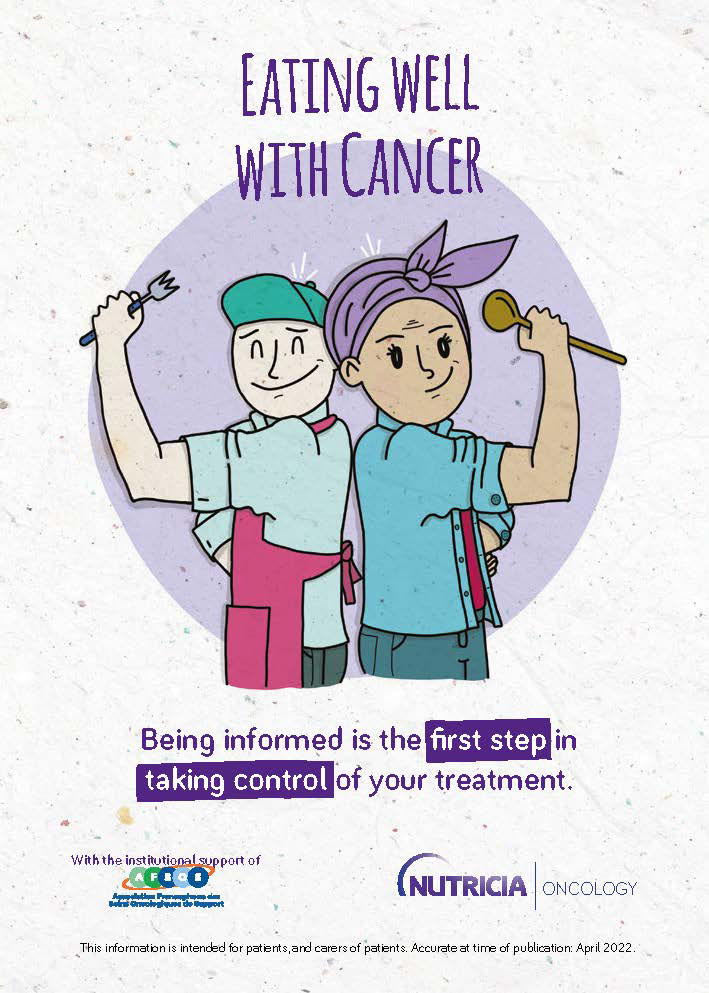Why am I losing weight?
Cancer and its treatment can change the way you eat, how well your body absorbs nutrients from food, and the way your body uses the nutrients. Eating and drinking less than usual is very common when you have cancer, but it means the body may not get the energy, protein and other nutrients it needs. This can mean you lose weight without meaning to (unintentional weight loss). Unintentional weight loss is common in patients with cancer but may vary depending on the type of cancer you have.
Any of the symptoms above can impact on your food intake, for example how much food you are able to eat or even the kinds of foods you will be able to manage. In addition, fear, stress or anxiety experienced upon receiving a cancer diagnosis or at any stage of your cancer journey may also impact on your appetite. For some, mealtimes may become less enjoyable and you may find that you have gone off foods that you previously enjoyed.
Some of the common symptoms or side effects experienced by people living with cancer may include:
- Make the most of times when your appetite is good
- Include nourishing drinks and snacks
- Take your time when eating
- Some people find eating with others present helpful.
- Before eating, rinse your mouth with a citrus drink (lemon, pineapple or orange juice) or drink a small glass to help you salivate and to stimulate appetite.
- Take regular exercise, at a level appropriate for you, to help stimulate your appetite. Fresh air can help too. Speak to your doctor and/or physiotherapist about the right level of exercise for you.
- Constipation, nausea, pain, fatigue and other side effects, as well as anxiety may also impact appetite. Speak to your doctor if you are experiencing any of the above.
- Eat foods that appeal to you and smell good. The foods which taste/smell good may change throughout your cancer journey
- Some people may also develop food aversions or "go off" foods they used to enjoy. Focus on the foods you like at any given time. You may wish to try any foods you have gone off again in a couple of weeks, as food preferences may change over time
- Maintain good oral hygiene
- Before eating, try rinsing your mouth with tea, saltwater or baking soda to help clear your taste buds
- If you are experiencing a metallic taste, trial plastic cutlery and limit intake of canned foods
- Try chewing fresh or tinned pineapple before meals to get rid of bad tastes
In the case of having a “bad taste” in your mouth, try:
- Sucking on a mint
- Cooking foods that develop little flavour (e.g. pasta, rice, potatoes)
- Cold foods/meals
- If opting for ready meals, choosing those with little salt (less than 0.3 g of salt per 100 g) and without sodium glutamate may help. These two flavour enhancers may intensify the bad taste in your mouth
- Decaffeinated tea/coffee or different flavours of fruit juice
- Cook red meats with hard cheese (e.g. Emmental) to mask the metallic flavour and choose white meats, fish or eggs
- Brush your teeth or rinse your mouth regularly but not too close to meals
- Try rinsing your mouth with vinegar water throughout the day
In the case of loss of taste sensitivity, try:
- Using spices, herbs, lemon juice, etc. to season meals
- Marinate meat, chicken or fish to help enhance the flavour
- Avoiding heating food/drink to extreme temperatures which reduce the flavour of food
- Cooking using smaller amounts of water to concentrate the taste of foods
- Combine sweet and savoury flavours (e.g. meat with grapes, prunes, honey, etc.)
- Chewing slowly to salivate
In the case of changes to smell, try:
- Eat food cold or at room temperature if strong smells bother you
- Chew your food well to enhance flavour perception
- The smell of hot foods is more intense; eat or avoid as appropriate to your changes in smell
- If you need to soften the texture of the food, mix foods separately to get a better sense of individual flavours
- In the kitchen, use fenugreek, fresh or powdered basil. Their flavour helps stimulate the sense of smell
For many people, normal taste comes back after treatment. For others, changes to taste and smell can persist for longer.
- Speak with your doctor if you’re feeling sick or nauseous. Your doctor may prescribe medicines to help
- Eat before you start feeling hungry, as hunger can make nausea worse
- Try to continue eating in small amounts. The more weight the stomach has, the less likely it is to reject food
- Try cold foods, which develop less nausea-inducing odours
- Get "baking bags" for the oven that allow roasts or poultry to be roasted without odour
- Use ginger and peppermint in yoghurt, sauces or cooking
- Take a “little and often” approach, eating smaller meals more frequently
- Relax after you have eaten
- Opt for foods that are neutral in taste or any foods other that you feel able to tolerate
- Take small, slow, regular sips of clear fluid throughout the day
- Try carbonated drinks, which can help reduce vomiting
- If you are sensitive to the smell of cooking, try to avoid the kitchen while food cooks (or ask for help with cooking). Ready meals might also be a good idea in this case
- Some people find relaxation or meditation may help manage symptoms of vomiting and/or nausea
- Contact your doctor is vomiting persists or gets worse
The following foods might help:
- Dry foods; toast, crackers, dry cereal
- Cold, bland foods; boiled potatoes, cheese, yoghurt, dessert
- Herbal teas, e.g. mint
- Ginger; ginger nut biscuits, ginger cake, or fresh ginger in hot water
Some of the following foods may make nausea worse:
- Greasy or fried foods
- Heavily spiced foods
- Foods with a very strong smell, such as garlic and onions
- Chop, soften or blend foods to make them less painful to chew. Make food smoother by adding cream, milk, butter, béchamel sauce
- Gently chew your foods
- Make the most of nourishing drinks and foods that require little to no chewing, such as yoghurts, custards, rice pudding, omelettes, scrambled eggs, mashed potatoes, cream soups, milkshakes, etc. Avoid rough foods (e.g. crispy breads) which may be painful to eat
- If undergoing chemotherapy, sucking on ice cubes during the chemotherapy infusion session may help to reduce the sensitivity of the mucous membranes to inflammation
- Avoid eating foods that can dry out the mouth such as: nuts, currants, bananas, tomatoes, grapes, apples, figs, hard cheese (Emmental, Comté), shellfish, chocolate, biscuits, bread, rice, potatoes
- Take a spoonful of crème fraîche, mayonnaise or a piece of butter at the beginning of your meal to grease your mouth and help you swallow. Or moisten your mouth with sauces/gravies before eating
- Give preference to cold food and drinks, to help soothe your mouth
- Avoid strong spices and foods that are too salty or too sweet
- Microwave acidic foods (vinegar, lemon, tomato) or pungent foods (garlic) for a few seconds to reduce their strength
- Cook acidic fruits or combine them with dairy products
- Drink through a reusable straw
- Speak to your doctor about mouthwashes, gels and medications that might help with your sore mouth
- Avoid acidic mouthwashes or those that contain alcohol.
If you experience any difficulties swallowing or notice food or fluid “going down the wrong way”, speak to your doctor, nurse or medical team as soon as possible. You may be referred to a Speech & Language Therapist who will assess your swallow and make recommendations specific to you. In the meantime, some of the following tips may be helpful:
- Choose softer foods and nourishing drinks (e.g. yoghurts, custards, smooth mashed potatoes, cream soups, milkshakes, etc.)
- Blend/liquidise foods as needed or soften foods with sauces and gravies
- Cook foods in a way that makes them easier to chew (e.g. cook meats until tender, serve vegetables well cooked). Chop up meat and vegetables into smaller pieces before eating. Serve as part of a casserole, stew or other moist dish
- Take your time eating and put small amounts of food in your mouth at one time. Chew well before swallowing
- Positioning is important. Sit upright for meals if possible. Try to remain in an upright position for about half an hour after eating
A Speech & Language Therapist may advise that you use a thickener in your food or fluids, to make them safer to swallow. Always speak to your medical team about any changes in your swallow ability.
Some days, you may feel too tired or fatigued to cook and might even find eating in itself tiring. Here’s some tips for managing your nutrition when you’ve got less energy:
- Ask family and friends for help with shopping, preparing, and cooking meals
- Prepare meals in advance, at times when you have more energy. Cook in bulk and freeze extra portions which can be used on days when energy levels are lower
- Frozen meals and tinned foods are handy to have in the house for days when you don’t feel up to cooking
- Nourishing drinks and foods that require little to no chewing (e.g. yoghurts, custards, rice pudding, omelettes, scrambled eggs, mashed potatoes, cream soups, milkshakes, etc.) require less energy to eat and might be more manageable on days when your energy levels are lower
- Find the balance between enough rest and regular exercise. Short naps during the day may help. Take some gentle exercise (e.g. light walk), if possible. Keeping relatively active can help minimise fatigue
Diarrhoea:
During episodes of diarrhoea, you may need to make changes to your diet for a limited period of time.
- Take regular sips of fluids to make up for losses with diarrhoea
- Smaller amounts of food
- Choose low-fibre cereals, e.g. white rice/pasta/bread
- Avoid raw vegetables and fruits, pulses, cabbage, mushrooms, onions, spinach, green beans and tomatoes during this period
- Avoid foods which can make diarrhoea worse, e.g. fatty, greasy or fried foods, fizzy drinks, caffeine (e.g. tea/coffee), citrus fruits or fruit juices and alcohol
- Be mindful that some “sugar-free” chewing gum or sweets may contain sorbitol, which can act as a laxative
- If diarrhoea persists or if you notice your stool (poo) is red in colour or darker than usual, speak with your doctor who may prescribe something to help control diarrhoea
Constipation:
- Try to eat regular meals, even if the portion sizes are smaller than before
- Choose high fibre foods, like wholegrain bread/pasta, pulses (peas, beans and lentils), fruit & veg. Adding flaxseed to cereal, yogurt or porridge to add extra fibre
- Drink enough fluids. Water, milk, tea, smoothies and soups all contribute to overall fluid intake
- Try to build exercise into your routine, at a level appropriate for you, as exercise can help to stimulate bowel movements
- Drink prune juice or fig syrup
- Some medications can cause constipation. Speak to your doctor about managing constipation while on certain medications or if constipation is ongoing. You may be prescribed a laxative to help manage constipation
Some people may experience "overflow" diarrhoea. This is when the bowel becomes blocked by hard, impacted faeces (poo), but some liquids manage to leak past the blockage. Keep an eye on changes to your bowel habits and speak to your doctor or nurse about any changes. If you have been very constipated and then develop diarrhoea, talk to your doctor or nurse before taking any medicine for constipation or diarrhoea.
- Try to moisten dry foods before eating. Use sauces and gravies to moisten meals
- Rinse your mouth regularly. Rinse before and after eating
- Take regular sips of fluid throughout the day. Carry a bottle of water with you
- Sucking on ice pops, frozen fruit or ice cubes might be helpful
- Rinse your mouth with a citrus drink (lemon juice, pineapple, orange) or drink a small glass to help you salivate. Sucking on frozen pineapple or boiled sweets might also help to stimulate flow of saliva
- Keep your lips moist with a lip balm
- Special mouthwashes and gels are available to help manage dry mouth. Speak to your doctor or pharmacist about this
The disease itself places huge nutritional demands on the body and as a result, many people experience unintentional, cancer-related weight loss during their cancer journey. It’s important to maintain your weight during this time, even if you are overweight at the start of your cancer journey. Even small amounts of unintentional weight loss can lead to loss of muscle stores, which in turn can have a negative impact on strength, independence and other outcomes.
Cancer treatments can also be very demanding on the body. In many cases, people being treated for cancer will need more calories and protein than normal.
While the prevention and management of undernutrition is central to nutritional care, the goals of nutritional management for each person living with cancer will depend on the stage at which they are at in their cancer journey. For some, the goal may be to support treatment tolerance and reduce adverse effects of treatment, while for others comfort and enjoyment of eating may be the priority.


